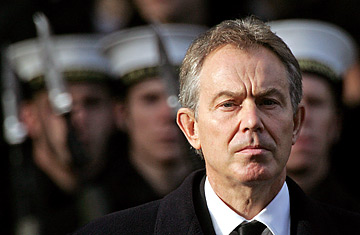
British Prime Minister Tony Blair.
However it is spun, what all of this undoubtedly also means is that just as the U.S. is gearing up its military presence in Iraq, Britain is looking toward the exit. The slimmed-down U.K. forces will concentrate on the training and support of Iraqi soldiers, on securing the Iraq-Iran border and on supporting any operations against extremist groups. A troop presence will be maintained into 2008. But, said Blair, it was important for Iraqis to see that foreign troops would not be stationed in the country for longer than necessary — and thus the Basra example could even give a boost to the Bush plan.
That interpretation raised wry smiles in Westminster, where cynical voices speak of the Prime Minister's last dash to secure his legacy by removing some of the stain of Iraq before he leaves office later this year. Defense experts also point to criticisms leveled last October by General Sir Richard Dannatt, then only six weeks into his new job as Chief of the General Staff. Britain should "get ourselves out sometime soon because our presence exacerbates the security problems. We are in a Muslim country, and Muslims' views of foreigners in their country are quite clear," said Britain's most senior military commander. "The original intention," he added, "was that we put in place a liberal democracy that was an exemplar for the region, was pro-West and might have a beneficial effect on the balance within the Middle East. That was the hope; whether that was a sensible or naïve hope, history will judge. I don't think we are going to do that. I think we should aim for a lower ambition."
According to a spokesman for Britain's Ministry of Defense, any troop reductions themselves still represent "an aspiration." Blair made clear to the Commons that the speed of the drawdown would be determined by ongoing assessments of the security situation. Certainly, he knows that he won't be there to oversee the final departure of British forces from Iraq. The former Europe Minister Denis MacShane, leaving the chamber at the end of the question-and-answer session, welcomed "the reduction of British troops in Iraq" and "a mission partly accomplished in Basra," but suggested that aspects of the insurgency in the country could never be appeased. Moreover he foresees a need for fresh commitments by Britain and other powers as terrorism and tyranny afflict populations in Africa and the Middle East. "Blair will be gone in three months' time," he said. But his successor "will have to confront very similar problems in different parts of the world."
